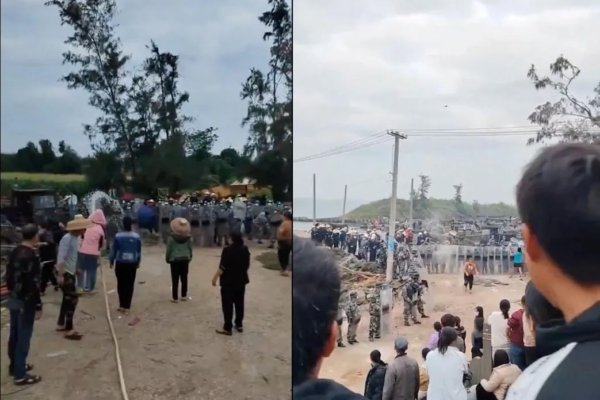On December 3rd, in Zhanjiang, Guangdong, villagers from Chengwu Village clashed with a large number of heavily armed armed police and special police deployed by the authorities in a “water battle”.
Due to the local government’s implementation of a policy banning the breeding of conch, cutting off the main source of income for the villagers, the villagers launched a rights protection movement at the end of September, which has continued to the present day. During this period, village cadres even led people to physically attack the villagers.
According to online sources, the village convened the entire village and called back young and middle-aged adults working outside to participate in the resistance.
Videos circulated online show the large number of heavily armed armed police and special police deployed by the local government, attempting to violently suppress the villagers’ protest demonstration. In the video, police cars deployed by the authorities lined the streets in a long line stretching as far as the eye could see.
However, the villagers showed no fear, fiercely resisting by spraying water and throwing water, lime powder, and other substances at the armed police and special police. There were also people in the crowd beating drums to boost morale, creating a lively scene with spirited voices.
The video sparked heated discussions among netizens. Many expressed opinions such as, “These soldiers only know how to attack ordinary people.” “Why ban sea breeding? Are they creating famine?” “Using stability maintenance funds to help the people find proper ways of living is the correct way to resolve conflicts between the government and the people. It’s clear that they don’t use this approach and instead choose to confront the people through creating conflicts. This behavior is hostile.” “If this continues, Chen Sheng and Wu Guang will appear sooner or later.”
The confrontation between the villagers and the authorities in Chengwu Village reflects a deep-seated tension arising from economic policies that adversely affect the livelihoods of the local residents. The clash of interests between the government’s regulations and the villagers’ economic needs has escalated into a physical confrontation, showcasing the growing discontent and resistance felt by the affected community.
Amidst the ongoing struggle for rights and resources, the villagers’ resilience and determination to defend their livelihoods against what they perceive as unjust government actions highlights the complex dynamics at play in the broader socio-political landscape. As the standoff continues, it remains to be seen how both sides will seek to resolve the conflict and address the underlying issues driving the confrontation in Chengwu Village.

